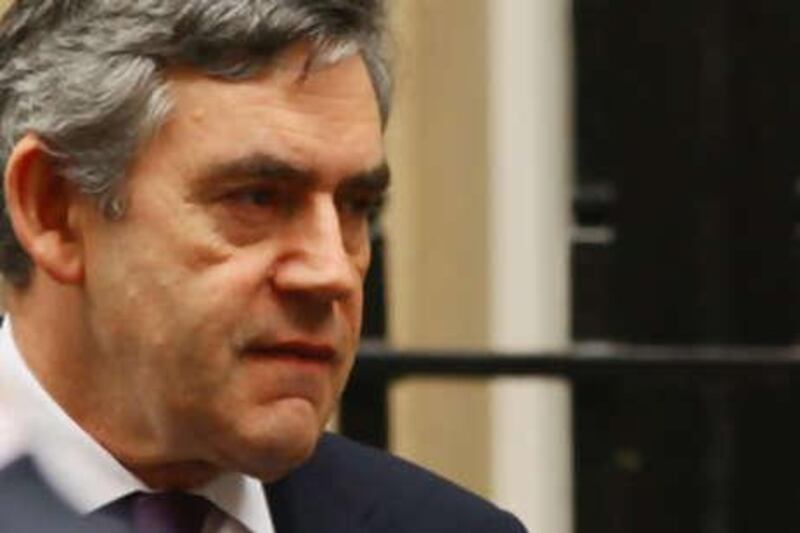LONDON // George Bernard Shaw once observed: "God help England if she had no Scots to think for her." Gordon Brown, a Scot perilously ensconced in fashionable Downing Street in London, is now nervously contemplating what his countrymen will think on July 24 when they vote in a crucial by-election in Glasgow. Even at the worst of times, the by-election in the Glasgow East constituency should be a shoo-in for Mr Brown's Labour Party, where it is defending a huge majority of 13,507, the third highest north of the border.
Unfortunately for the British prime minister, the worst of times just seem to keep getting worse and even one of his own ministers last week refused to predict that the party would successfully defend this safest of seats. "Only an idiot predicts outcomes of by-elections," said David Cairns, Scotland Office minister. "I'm confident enough to say we're going to fight very hard and we'll be standing up for the east end of Glasgow."
This far-from-ringing endorsement of Labour's chances of holding the seat on July 24 was, perhaps, a predictable attempt to lower expectations after two recent disastrous by-election results for Labour - it lost a massive majority to the Conservatives in Crewe and came in a humiliating fifth in Henley - along with a trouncing in local council elections in May. Now, a survey of political analysts, who have been unnervingly accurate in predicting recent election results, has indicated that Labour will, indeed, narrowly lose Glasgow East to the Scottish Nationalist Party (SNP), whose candidate at the general election three years ago finished second but polled only 5,268 votes to Labour's 18,775.
The SNP would need a massive swing of almost 22 per cent to take the seat but, if the party manages it, it "would be a devastating blow to the [Labour] party and make Gordon Brown's position well-nigh untenable", according to Angus Macleod, Scottish political editor of The Times. With Mr Brown's approval rating as prime minister and the party's fortunes at the lowest ebb in anyone's memory, Labour's problems in Scotland were compounded by the resignation last week of Wendy Alexander, their leader in Scotland.
She quit "with deep regret" after it was announced that she was to be suspended for one day from the Scottish parliament for breaking rules on political donations. Ms Alexander, the sister of a minister in Mr Brown's cabinet, was found by an independent watchdog to have failed to register donations to her leadership campaign, even though she said she had acted in "good faith" after receiving advice from the parliamentary authorities.
It is widely accepted that she resigned to avoid causing the Labour Party more embarrassment in Scotland. The timing, however, turned out to be dismal for the party as her resignation came on the day that David Marshall, the sitting MP in Glasgow East, announced that he was stepping down after a lengthy battle with depression. Party managers are now so concerned that an unsightly scrap within Labour ranks to succeed Ms Alexander could prove a distraction to the by-election fight, that they are meeting this week to delay the contest over the leadership election.
All of which has left Scottish Nationalists licking their lips over the prospect of the by-election, with Angus Robertson, the party's leader in the House of Commons, confidently predicting on the BBC recently that the nationalists would gain the seat. The party's only complaint is over the timing, which falls in the Glasgow Fair fortnight, the time when, traditionally, working-class families leave the city for their annual summer holidays.
Alex Salmond, the SNP leader, has accused Labour of disenfranchising voters by choosing the holiday period for the poll, although ministers have countered that, unless the by-election is held this month, it would not be possible to arrange it until October. Mr Salmond, however, remains unconvinced. "Their tactics to remove people from the by-election by holding it during the Glasgow Fair will backfire badly and the SNP will fight a strong campaign to win.
"The deadline for getting a postal vote is July 9 - people in Glasgow East must make sure Labour does not succeed in disenfranchising them." All of which has left the Conservatives, the main opposition party in the Westminster parliament but who do not stand the slightest chance of making inroads in Glasgow East, sitting on the sidelines with contented smiles on their faces. The prospect of Labour doing badly in the by-election, let alone losing it, will only boost the hopes of David Cameron, the Tory leader, becoming prime minister sooner rather than later.
And while the Conservatives, who came a poor fourth behind the Liberal Democrats at the last election, have no chance in the seat, they are using it to showcase a candidate who does not come from the usual mould of white, middle-aged, middle-class Tory businessmen. Davena Rankin is 34, black, a leading trade unionist and a scientist. She is also Scottish and accuses Labour of "abusing and neglecting Glasgow when it should have been standing up and fighting for the people of this city".
She will not win, of course, but she does not expect to. Mr Brown, on the other hand, needs to win like he has never needed to win before. God help England's Scottish prime minister if he does not. @Email:dsapsted@thenational.ae






